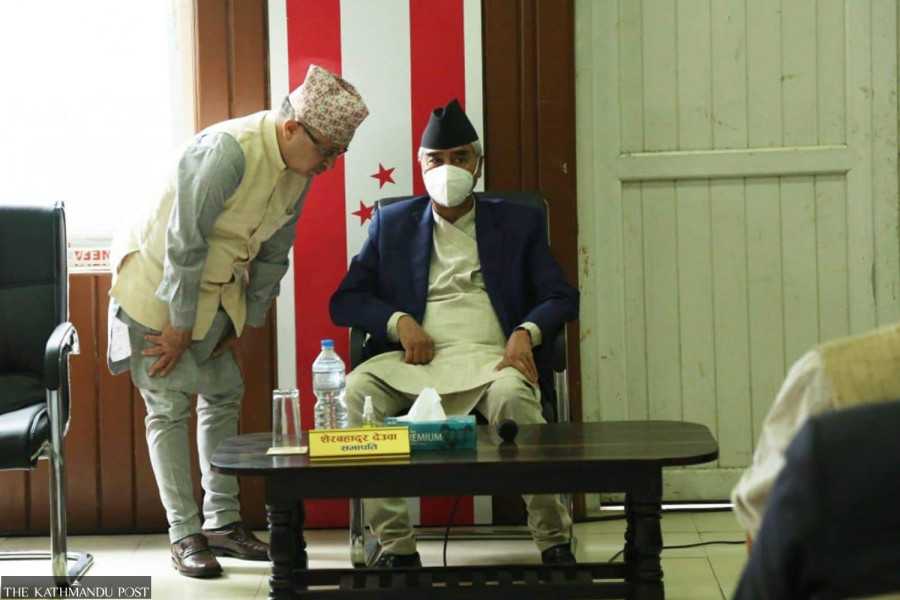Politics
As seat-sharing talks linger on, leaders tell Congress not to settle for less than 100 seats
Deuba says the party should be ready for some compromise to keep the coalition intact.
Anil Giri
An agreement on seat-sharing among the ruling coalition parties is getting more difficult by the day with leaders of the Nepali Congress, the largest among the five parties, adamant to compromise for fewer than 100 first-past-the-post lower house seats in the November 20 elections.
During a consultation meeting of the current and former office bearers of the Nepali Congress on Wednesday, most participants said the party should not settle for less than 100 seats, several leaders of the party told the Post.
Their suggestion comes at a time when a task force of the ruling alliance has been unable to figure out how to divide the 165 federal parliament seats and 330 provincial assembly seats among themselves. The elections to the federal and provincial governments are scheduled for November 20.
Senior Nepali Congress leader Krishna Prasad Sitaula is leading an 11-member taskforce that is mandated to recommend a seat-sharing formula.
Almost all Congress leaders at Wednesday’s meeting said the party should get no less than 100 first-past-the-post seats. They said their claim is based on the proportional representation votes the party received in 2017 and its performance in the May local elections, an office bearer told the Post. Nepali Congress had received second highest votes after CPN-UML under the proportional representation system with 40 seats. But in the recently concluded local elections in May, Nepali Congress emerged as the largest party winning chiefs in 329 of the 753 local units.
But the party’s demand looks unreasonable since there are just 165 FPTP lower house seats on offer and the CPN (Maoist Centre) wants 60 for itself, the CPN (Unified Socialist) is looking for 25, and the Janata Samajbadi Party is eying not less than 16 seats.
As per an initial agreement, the alliance plans to divide provincial assembly seats in the same ratio as federal parliament seats.
The 11-member task force is also considering the results of both the federal and local elections of 2017 and the votes received by each of the alliance members in the May local elections.
Some Congress leaders had also called for inducting the Loktantrik Samajbadi Party (LSP) into the ruling alliance.
“We can share some seats assigned to us with the LSP if other alliance members agree,” the office bearer said. “For this we need at least 100 seats.”
The rival camp in the Congress led by Shekhar Koirala has been constantly pressuring the leadership to secure at least 100 FPTP seats. But leaders close to the establishment camp led by Deuba say the party should be ready to settle for less in order to keep the alliance intact and their biggest electoral rival, the main opposition the CPN-UML, in check.
Leaders including Shekhar Koirala and former vice president Bimalendra Nidhi were of the view that the LSP should be brought within the alliance. Although LSP leaders, seeking to join the alliance, have held several meetings with Prime Minister Deuba, he has not been able to decide as other alliance members appear uninterested in inducting a new member.
Koirala on Wednesday even proposed that the Nepali Congress contest the elections from all constituencies where it has a strong vote base.
“There are certain electoral constituencies where Nepali Congress can contest and win single-handedly, so the party should not cede such seats to alliance members as vote transfer is difficult to predict,” the office bearer quoted Koirala as saying at the meeting. “We should not do anything that could benefit the opposition parties.”
Koirala even warned that Congress could see a mutiny in the party is allocated fewer than 100 seats as there are many candidate hopefuls, according to the leader.
Meanwhile, Deuba instructed leaders not to utter a word in public against the ruling alliance. “The alliance was formed as decided by the Central Working Committee; it is not an individual decision. So don’t criticise alliance partners,” Deuba told the meeting, according to an office bearer.
Meanwhile, senior leader Ram Chandra Poudel said votes received in the 2017 elections should not form the basis for seat-sharing. Nepali Congress had won just 23 FPTP seats out of the 165.
“We contested alone in the 2017 elections while the Maoist Centre had allied with the CPN-UML and the Unified Socialist didn’t even exist so the two parties should not claim seats based on the alliance’s performance in 2017,” Poudel said.
Despite most of the office bearers insisting on at least 100 FPTP seats, Congress spokesperson Prakash Sharan Mahat, who is considered close to Deuba, hinted that the party might have to compromise for fewer than 100 seats.
“How many seats Congress will get will be based on negotiations, which are ongoing, and the party should be ready for some compromise to save the coalition,” he said.




 13.12°C Kathmandu
13.12°C Kathmandu














